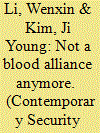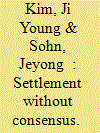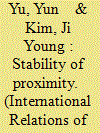|
|
|
Sort Order |
|
|
|
Items / Page
|
|
|
|
|
|
|
| Srl | Item |
| 1 |
ID:
128740


|
|
|
|
|
| Publication |
2014.
|
| Summary/Abstract |
Despite highly favorable conditions for cooperation, South Korea and Japan have experienced almost constant diplomatic conflict since the end of the Cold War, in large part because of unresolved history disputes. Through the theoretical approach of symbolic politics, I examine the substance of these conflicts and the processes by which specific group identities affect policymaking in and the relationship between the two countries. Based on three case studies I suggest that diplomatic conflicts are the result of identity clashes between a group of Japanese conservative elites and the South Korean public, manifested through the elite-led process of symbolic politics in Japan and the mass-led process in South Korea. These findings help analysts understand the patterns that these conflicts exhibit and assess the prospects for future reconciliation between South Korea and Japan.
|
|
|
|
|
|
|
|
|
|
|
|
|
|
|
|
| 2 |
ID:
179973


|
|
|
|
|
| Summary/Abstract |
Why did Japanese Prime Minister Abe impose controversial export restrictions after rulings by the South Korean Supreme Court on wartime forced laborers? This article answers this question through the lens of domestic symbolism in economic sanctions studies. We argue that domestic political calculations led the Japanese government to adopt hawkish measures against South Korea. Abe wanted to ensure continued support from his constituents and to win the upcoming election. A series of political reforms since the early 1990s have empowered the prime minister and made LDP politicians pay more attention to public opinion than to factional topography. Strong anti-Korean sentiment among the Japanese public reduced the leadership’s concerns about the audience costs of economic countermeasures. Through an examination of the interplay among various domestic actors over the policy measure, this study provides insights on how domestic symbolism can serve as an origin of foreign policy decision-making in democracies.
|
|
|
|
|
|
|
|
|
|
|
|
|
|
|
|
| 3 |
ID:
174731


|
|
|
|
|
| Summary/Abstract |
What has driven China’s policy toward United Nations (UN) sanctions on North Korea? While insisting on a peaceful settlement of North Korean nuclear issues via diplomatic dialogues, China has gradually loosened its protective stance regarding UN sanctions on North Korea. This article examines the factors that have pushed China to take a tougher position toward North Korea: North Korea’s increasingly aggressive nuclear policy, the influence of the United States on Chinese foreign policy, and the changing perception of North Korea in China. Through close examination of China’s domestic discussions on North Korea, this article concludes that, besides the external factors, a growing negative perception of North Korea has played an increasingly important role in changing China’s official stance. The findings suggest that closer attention should be paid to the changes in the domestic political environment of China to understand its current and future approach toward North Korea.
|
|
|
|
|
|
|
|
|
|
|
|
|
|
|
|
| 4 |
ID:
140730


|
|
|
|
|
| Summary/Abstract |
What explains the Japan–South Korea security relationship in the post-Cold War period? This article highlights the impact of the conflict and convergence of identity factors vis-à-vis external factors (such as the North Korean military threat, the regional presence of US forces, and growing Chinese power) to offer a more comprehensive explanation of the ebb and flow of security cooperation between Japan and South Korea. This article argues that in some cases, the identity factors affect security cooperation more than external strategic factors. Based on three in-depth case studies, the article provides an empirical examination of how identity factors have affected the overall pattern of Japan–South Korea security relations since the 1990s. The analysis will have important implications for our understanding of the role of identity factors between Japan and South Korea, as well as envisioning the possibilities of regional security cooperation in the future.
|
|
|
|
|
|
|
|
|
|
|
|
|
|
|
|
| 5 |
ID:
152075


|
|
|
|
|
| Summary/Abstract |
What has shaped contemporary discourse on Japan’s comfort women issue? During the last twenty-five years, civic groups in both Japan and South Korea have made significant efforts to publicize the issue within the international community, hoping to narrow the disparity between the position of the international community and that of the Japanese government. Thus far, however, Japan’s official position has shown little change. Why has international pressure on Japan failed? By focusing on the relationship between international pressure and the formation of Japan’s discourse on the comfort women issue, this paper shows how outside pressure led to a domestic backlash among conservatives in Japan, resulting in the failure to institutionalize apologetic discourse within Japanese society. This study will provide important insights on how democratic countries can sometimes resist strong external pressure to conform to international norms.
|
|
|
|
|
|
|
|
|
|
|
|
|
|
|
|
| 6 |
ID:
165985


|
|
|
|
|
| Summary/Abstract |
The Senkaku/Diaoyu dispute, a territorial dispute between Japan and China, has long been regarded as a ticking bomb, capable of blowing up the already volatile Sino-Japanese relations at any time. Would the differences over the islands lead China and Japan into major military confrontations, if not all-out war? This article argues that there is cause for optimism and that the Sino-Japanese relationship has displayed a remarkable level of resiliency through the years. In examining the three major diplomatic crises of 2004, 2010, and 2012 (and beyond) surrounding the Senkaku/Diaoyu dispute, this article shows that Japan and China have successfully engaged in bilateral crisis management by operating political, diplomatic, and military exchanges to prevent further escalation. Our analysis calls for a more informed and balanced view within academic discourse, so as to encourage accurate threat perceptions between China and Japan, mitigate the security dilemma, thereby eventually fulfilling the optimistic theory.
|
|
|
|
|
|
|
|
|
|
|
|
|
|
|
|
|
|
|
|
|